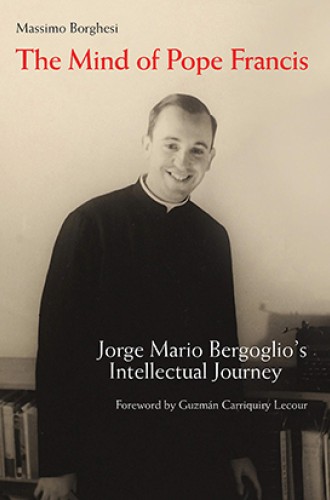Pope Francis the populist intellectual
The pope doesn't always show off his theological talents. Does that matter?
In Buenos Aires, Archbishop Bergoglio’s priests called him “Jorge.” He knew them all by name. He didn’t have the usual car and driver. He refused to live in the upscale bishop’s residence. He’d gladly listen to confessions while riding the subway. This is not only the sort of man a priest wants as a bishop, but the sort that Catholics want in a pope.
Or is it? Many conservative Catholics are quite unhappy with Pope Francis because of his passion for social justice, his welcoming comments on gay and divorced Catholics, and what they perceive as his weak defense of traditional Catholic teachings. One strand of this critique suggests that Francis lacks the theological and philosophical capacities to handle the papal office.
Read our latest issue or browse back issues.
Massimo Borghesi’s book aims to be a partial response to that critique by displaying the range of Bergoglio’s intellectual preparation. Young Jorge’s studies, the reading of his Jesuit regency, and the contents of his library while provincial of the Argentine Jesuits are all reviewed in careful detail. I find the book fascinating. But I disagree with the concept behind it.
The writings, teachings, and actions of a life are ultimately more significant than the scholarly caveat behind it. I could be a graduate of Choate and Harvard and still be a buffoon. I could have read all the important books and not retained a thing or applied anything meaningfully to my life. So I’m not impressed when Borghesi writes: “Like many who made up the new generation of Catholics in Argentina, Bergoglio was an assiduous reader of Criterio, a journal published in Buenos Aires under the editorship of Father Jorge Mejia.” What a religious leader says, does, and writes ultimately matters far more than what he reads.
Borghesi wants us to realize there is terrific learning and thinking behind Francis’s ideas when he quotes from Alessandro Manzoni’s popular novel The Betrothed, from Jorge Luis Borges, G. K. Chesterton, or Thomas Merton, rather than from philosophers and theologians. His argument is that Pope Francis does not like to show his talents theologically, and that he’d never want to be considered intellectual or compared to his predecessor. So, Borghesi suggests, Francis is what he doesn’t say he is.
Will this analysis mollify the conservative critics? I don’t know. But the approach strikes me as a mistake. What one does with one’s education is more important than that education by itself.
It should be mentioned that Pope Francis cooperated with this effort in the form of audio recordings, answering questions about how much a book or thinker influenced him, saying things like “that work gave me so many elements that later became mixed in [to my thinking],” and “in ’69 I was ordained a priest and I read this in the years when I was studying philosophy or in the first year of theology.”
Section headings read like language from a theologian’s textbook rather than from the mind of the man we know as Pope Francis. For instance, there are these: “The Unity of Universal and Particular, Center and Periphery: The Lesson of Amelia Podetti” and “Polar Opposition and the Common Good: Sineidetic Thought.”
At times, Borghesi does reveal links between Bergoglio’s reading and what he has chosen to emphasize as pope. Pope Francis’s theology of politics, for instance, shows the influence of a “rejection of messianic populism” and a rediscovery of Augustine’s De civitate Dei that began decades before his election. As Borghesi explains, this is significant “because the Augustine of The City of God was at that time quite neglected by scholars.”
Bergoglio’s embrace of liberation theology, too, without any attendant Marxist ideology, set him apart from many other Catholic leaders of his time and on his continent. Borghesi provides long quotations from talks given by Bergoglio to Argentine Jesuits to demonstrate this. Borghesi also demonstrates how Bergoglio’s reading in economic and political theory—especially the work of the important Uruguayan Methol Ferré, Bergoglio’s exact contemporary—has informed the pope’s understanding of the primacy of the economy in the era of globalization.
Borghesi goes to great pains to explain that Bergoglio’s lifelong commitment to dialogue, unity, and respecting diversity is a rejection of Hegel’s philosophy. He writes, “Unlike Hegel and his ascending dialectic, which never returns, Bergoglio’s dialectic lives by antinomies.” I’m inclined to let Bergoglio himself make those connections if he chooses to. Otherwise, we can just as easily assume that his commitments reflect the life and teachings of Jesus.
Chesterton wrote in Orthodoxy, “Poetry is sane because it floats easily in an infinite sea; reason seeks to cross the infinite sea, and so make it finite. The result is mental exhaustion.” This is why theological reasoning is relatively uncommon outside of classrooms and academic journals. The alternatives to theological reasoning can be frightening, as we see now on social media, where posturing and shouting carry the day. But poetry—a deliberately less complicated approach to faith and thinking—is like fresh air. That’s what I find most of all in Pope Francis’s writings, homilies, exhortations, and interviews, regardless of what he read in school.






